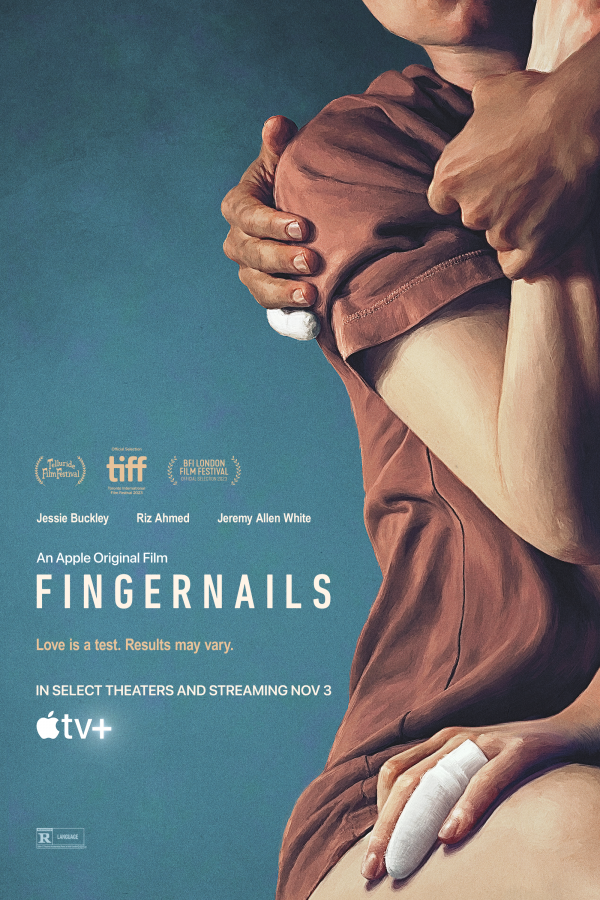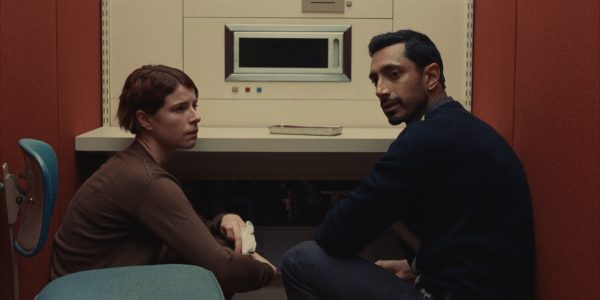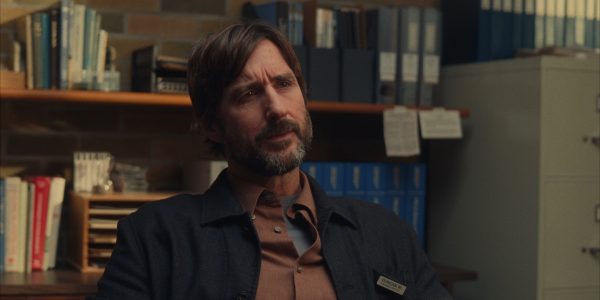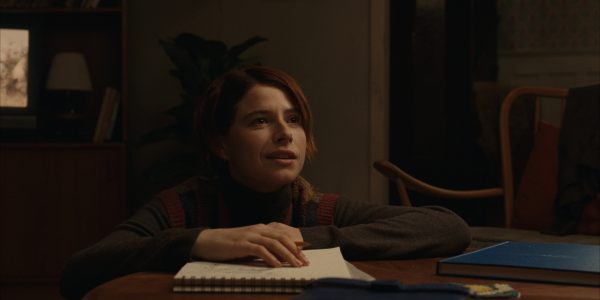
“Fingernails” (2023). Cast: Jessie Buckley, Riz Ahmed, Jeremy Allen White, Luke Wilson, Christian Meer, Amanda Arcuri, Annie Murphy, Albert Chung, Heather Dicke, Tameka Griffiths, Juno Rinaldi. Director: Christos Nikou. Screenplay: Christos Nikou, Sam Steiner and Stavros Raptis. Web site. Trailer.
How do we know when we’re in love? And, even if we suspect we are, how do we know if we’re with the right person? In an age where individuals are increasingly out of touch with their own feelings – especially the one they seem to crave the most – these are pressing questions that desperately beg answers. So what should we do? Maybe technology is the answer. But how reliable is it? Can we trust it to give us definitive, accurate, meaningful results? Those are the issues raised in the heartfelt yet delightfully offbeat new romantic comedy-drama, “Fingernails.”
Anna (Jessie Buckley) and Ryan (Jeremy Allen White) have been a couple for three years. They got that way thanks to a radical new medical test that had been developed to verify the truthfulness of their compatibility and love for one another. Strangely enough, the researchers who developed the technique found that bona fide amour for another person (regardless of sexual orientation) begins in, of all places, one’s fingernails. So, to determine the validity of those feelings for one another, test participants are required to each have one of their fingernails removed (talk about an act of commitment), which are then simultaneously run through a specialized electronic device that reveals the results, providing supposedly unquestionable proof of a couple’s true love (or lack thereof) for one another. And, thanks to the test results for Anna and Ryan, they were scientifically declared a perfect match.
Despite such seemingly convincing evidence, however, not everyone is sold on the procedure and its supporting technology. Some doubt its accuracy, and others believe that good old-fashioned gut feelings are better romantic indicators for finding prospective mates. Many are also afraid to undergo the procedure for fear of what results might turn up, given the test’s supposed infallibility and the fact that negative responses heavily outweigh positive outcomes. Nevertheless, those who are pleased with their findings swear by the procedure, especially since the number of positive results has been steadily rising, despite still being in the minority of outcomes. And, while taking the test is not compulsory, its advocates’ numbers have been growing, and they have actively sought to encourage others to take it.
But, even with the procedure’s allegedly impeccable record of accuracy, can it really be trusted? That’s something Anna speculates about, especially since her relationship with Ryan appears to have been growing progressively stale over time. She can’t help but wonder if she and Ryan have simply fallen into a rut or whether their test results were wrong. She quietly decides to investigate further.
As a schoolteacher by profession, Anna tells Ryan that she’s looking for a new job while discreetly seeking employment at a company called The Love Institute. This organization, the brainchild of its founder, Duncan (Luke Wilson), administers the test to would-be partners. However, in an effort to help bolster positive results (and lessen the anguish for those who receive negative outcomes), the Institute offers various training exercises designed to measure the intimacy of aspiring couples. Most of these exercises are based on placing participants in scenarios where the depth of their feelings for, and commitments to, their romantic prospects are demonstrably drawn out, a supposed indicator of whether their compatibility is sufficient enough to move ahead with the test – and to help prepare them for the results they get.

While the intent behind these exercises is seemingly sincere and rooted in what is apparently sound logic, they are, nevertheless, largely romantically clichéd, superficially naïve and often preposterous, making them hilarious to witness, despite the genuine faith that their participants and facilitators appear to place in them. The exercises include situations like skydiving together to measure the couples’ responses to one another under potential duress. Another requires them to give themselves minor electric shocks with tasers when one of them departs and leaves the other alone, a gesture designed to evoke the pain of separation anxiety and thereby deepen their feelings for one another. And still others are in the development stage, such as placing the couples in a movie theater and (unbeknownst to them) simulating the outbreak of a fire to examine their commitment to one another in a crisis situation. (Yeah, like those are all going to work.)
Despite the strangeness of all this, Anna forges ahead and lands a job at the Institute, serving as an exercise facilitator. She hopes that spending time learning these concepts for herself will help her assess the state of her relationship with Ryan. However, in an effort to keep him from becoming unduly worried about the reasons behind this unexpected employment decision (and potentially undermining the health of their relationship, whatever is left of it), Anna says nothing about the new position, instead pretending to have landed a job at a new school. Ryan doesn’t suspect that anything is wrong, but he seems a little perplexed by some of her behavior and uncharacteristic suggestions for leisure-time activities, all of which are based on insights she gleans from her new job. She tries to keep her true intentions low key through this process, but, as these situations unfold – and the outcomes from them further raise her suspicions about the viability of their relationship – she grows increasingly uncomfortable and unsure about how long she can remain silent about what she’s doing.
Circumstances grow more complicated when she’s assigned to shadow a fellow facilitator, Amir (Riz Ahmed), to learn the ropes of the job. They get along famously, and, as time passes, it becomes apparent that there’s more going on here than the development of a collegial working relationship. An undeniable, decidedly sensuous mutual attraction begins to surface, but they keep their feelings to themselves, never saying a word about what’s quite obviously emerging. In part that’s due to the fact that they’re both in verified committed relationships, Anna with Ryan and Amir with his partner of two years, Natasha (Annie Murphy). In part, that’s also due to their status as co-workers. And, in yet another part, that’s due to the fact that they’ve made relationship decisions based on the results of a procedure in which they’ve supposedly placed their complete trust. But are those considerations reasons enough to keep them apart? Is it possible that what’s in their hearts can trump what’s in their fingernails?
As these feelings intensify, Anna approaches Duncan with a hypothetical – is it possible for someone to develop feelings of true love with more than one person? He insists that the answer is “no.” He compares such a scenario to that of a woman six months into a pregnancy who suddenly and simultaneously becomes pregnant for a second time – an innately physical impossibility. She’s dejected by his response, but she also can’t ignore her emotions. What is she to do?

While Anna attempts to sort out her feelings, she also becomes aware that Amir’s relationship with Natasha is not everything he claims it to be. This, coupled with the growing sense of loneliness she’s experiencing in her partnership with Ryan, leave her uncertain about her future. How can she resolve this situation? And what will it bring her? Love may be a many splendored thing, but it can also be as confusing as hell.
The fact that many of the individuals in this story feel the need to draw upon something outside of themselves – namely, the procedure and the technology that together dictate results to us that we can’t figure out on our own – in itself illustrates the lack of faith we place in our beliefs to guide us in answering our own questions, determining what we want for ourselves and envisioning what will transpire down the road. Consider the examples set by two of the couples seeking assistance in the film, Rob and Sally (Christian Meet, Amanda Arcuri) and John and Maria (Albert Chung, Heather Dicke). Simply by watching how they handle the exercises and interact with one another, it should be patently obvious what kinds of test results they’re going to get, and, as a consequence of this, they’re likely to formulate beliefs (consciously or not) that carry them in the direction they’re destined to head, for better or worse. But, either way, in their cases, their own internally developed convictions don’t appear to be enough to provide the necessary clarity, and so they rely on the findings of a dubious procedure and a machine resembling a microwave oven to give them the answers.
Can’t these couples genuinely tell for themselves? Seriously? It’s been said that, because we can be so unavoidably close to some situations, we’re unable to see them for what they really are, that we really can’t see the proverbial forest for the trees. Or, put another way, love truly may be blind; otherwise, it might see too much. But is this sentiment a viable explanation for this perspective or a convenient cop-out that allows us to grow comfortable with the denial of our own insights?
That’s an intriguing question, to be sure. And it takes on new light when it’s put to the facilitators at The Love Institute – the supposed experts in these matters – when it comes to looking at their own relationships. Even the casual observer can see that things aren’t exactly working between Anna and Ryan and between Amir and Natasha. For instance, when Anna seeks to cozy up with her man for a warm, intimate evening at home, one might think that would involve something more romantic than sitting on the couch and watching a wildlife documentary about caribous, especially when Ryan seems to be paying more attention to the film than to the person next to him. This cringeworthy discomfort is further echoed by Anna’s reluctance to tell Ryan about taking a job at the Institute; if he’s truly her loving partner, why can’t she be honest with him about something so basic as this?
Similarly, when both couples attend a party one evening, Anna is surprised that Natasha seems unaware of Amir’s gluten allergy, something that Anna became aware of in passing while she and Amir shared lunch at work one day. Anna legitimately wonders how an individual supposedly so intimately involved with another could not know something as potentially important as that.

In both of these cases, the unsettled partners suspect that something is amiss in their relationships, but they don’t see the handwriting on the wall. Is it because they don’t believe in such disconnects? Or is it because they don’t want to believe in them? If the latter is the case, that’s probably because they’re afraid of the ramifications of embracing the true beliefs that they hold about their circumstances deep down inside. Doing so could readily cause everything to unravel in their partnerships. What’s more, though, buying into these notions would shake their faith in the validity of the procedure and the supposedly infallible results it yields. That would clearly undermine the work they’re doing as facilitators and make them feel (and possibly look) like hypocrites. But, even more profoundly, such an admission would put the responsibility for making their own romantic decisions squarely back on their own shoulders. They would no longer be able to abandon their accountability for their actions by putting it in the hands of a cold, unfeeling medical procedure and arbitrarily relying on the results its technological cohort spits out. That would ostensibly be more blind than love itself. Relationships, it would thus seem, can be very scary undertakings indeed.
But doesn’t that consideration come with the territory where love is concerned? Love is an exploration that takes us into uncharted territory potentially filled with great wonders that exceed our imaginations. It tests us, both in terms of our willingness to explore such possibilities and to do so with a caring, endearing companion who accompanies us for the ride. There are no guarantees in this, however, and that can be incredibly frightening to those who aspire to live in a reality where they insist upon certitude up front. But imbuing our existence with such rigid, intractable certainty also removes much of the spontaneity and exhilaration that come with such a wondrous journey. So which of the foregoing options is preferable in the end?
Those who are willing to take the risk must therefore be willing to make a commitment to such an unscripted odyssey, and that calls for examining one’s heartfelt beliefs to determine who would make a suitable traveling companion – someone we can believe in, someone who is the right person to take the plunge with, not someone who’s the product of a computer-generated readout based on potentially suspect research. The evidence of that is ironically borne out in a scene early on in the film at a meeting of the Institute’s new facilitators in which one of the fledgling recruits (Tameka Griffiths) innocently asks Duncan, “What do we do if someone [seeking to take the test] has no arms?”, to which he simply replies, “I don’t know.” No arms, no fingernails, no proof of innate compatibility. So much for science having all the answers when it comes to love. Game, set, match.
As potentially implausible yet delightfully quirky as “Fingernails” is, this insightful romantic comedy-drama nevertheless takes viewers on a heartfelt, albeit absurdist, odyssey about the nature of love. Writer-director Christos Nikou’s second feature outing, an excellent follow-up to his superb debut, “Apples” (“Mila”) (2020), hits his second cinematic home run in a row. The filmmaker explores the subject in a highly unconventional way, presenting audiences with a decidedly offbeat but thoroughly thoughtful “what if” approach to something for which we all seek guidance, feedback and answers. In an age where the many lost souls among us seek enlightenment and verification of our feelings through almost any means possible, Nikou shows us a good place to start, one that many often unwittingly overlook (or willfully ignore). The film accomplishes this by skillfully weaving together these profound ideas with sublime yet sidesplitting humor and eccentric, enigmatic theoretical concepts that give us much to ponder, qualities that helped to stylistically establish and distinguish Nikou as a director, both in his first film and again here. In this offering, however, he builds upon that artistic foundation by adding themes aimed at promoting truly genuine feelings aimed at plucking the heartstrings without becoming manipulative or sappy, creating a layered, thought-provoking, richly rewarding viewing experience.

This is all brought to life by the fine performances of the three protagonists and an excellent supporting cast, backed by skillfully crafted humor parodying a number of other films (such as a hilarious send-up of a famous scene from “Ghost” (1990)) and a nuanced soundtrack consisting of deftly chosen selections that definitively set the mood for countless scenes. Admittedly, the generally solid pacing could have used some tweaking in a few sequences, and the ending could have been a little better developed, but these modest shortcomings detract little from the overall quality of this fine production. If you doubt that, see this one for yourself and let your own mind – and not some technical contraption or overly intellectualized abstraction – decide for you. The film has been playing the festival circuit and had a brief, limited theatrical release, but it’s now available for streaming online as an AppleTV+ exclusive.
Can old-fashioned intuition legitimately trump allegedly solid science, particularly at a time when technology is being trumpeted as a panacea for all of our problems, including those of an emotional nature? If you have to ask the question, you may well miss the point that this picture is trying to make. But, if you’re unsure about that, give this one a look to see what it has to say. And, if you’re still not clear about the answer after that, consider taking up residence at a cloistered monastery, a step that should allow you to cross off one of the biggest line items on your life’s to-do list.
Copyright © 2023, by Brent Marchant. All rights reserved.

No comments:
Post a Comment